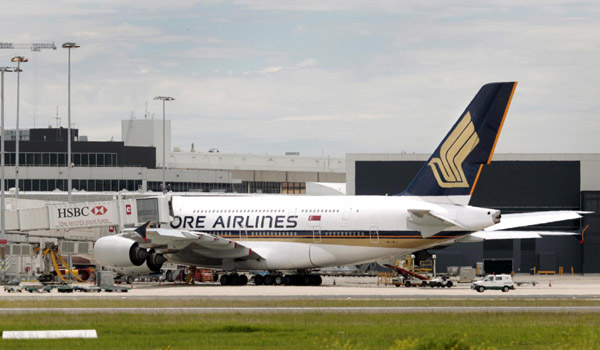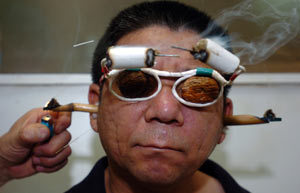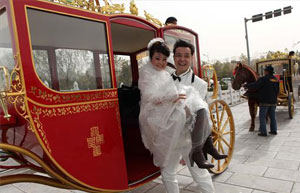Singapore Airlines pulls 3 A380s due to engines
Updated: 2010-11-10 19:33
(Agencies)
|
 A Singapore Airlines Airbus A380 stands at a gate of the international terminal of Sydney airport November 10, 2010. [Photo/Agencies] |
SYDNEY - Tests uncovered oil stains in three Rolls-Royce engines on Singapore Airlines' A380
superjumbos, prompting the airline to yank the planes from service Wednesday just two days after Qantas announced troubling oil leaks on their A380s.
The oil on the Qantas and Singapore planes was discovered during tests prompted by the explosion of a Rolls-Royce engine on a Qantas A380 during a flight from Singapore to Sydney last week. The plane made a safe emergency landing in Singapore, but the Australian airline immediately grounded its entire fleet of A380s while it investigated the cause.
| ||||
"We apologise to our customers for flight disruptions that may result and we seek their understanding," airline spokesman Nicholas Ionides said in a statement.
On Monday, Qantas CEO Alan Joyce said tests had uncovered oil leaks in the turbine area of three engines on three different A380s. The leaks were abnormal and should not be occurring on new engines, he said. All six of the Australian airline's A380s remained grounded Wednesday.
London-based Rolls-Royce, an aerospace, power systems and defense company that is separate from the manufacturer of Rolls-Royce cars, had recommended a series of checks for the Trent 900 engines that are used in the A380s operated by Qantas, Singapore Airlines and Germany's Lufthansa.
Singapore Airlines grounded its entire fleet of 11 A380s following last Thursday's engine explosion on Qantas, but after initial checks, returned them to service on Friday. However, on Wednesday, based on fresh analysis of the tests, Singapore took three of its A380s out of service again, due to oil stain results.
Singapore's eight other A380s, also flying with Trent 900 engines, remain in service.
The most likely cause of an oil leak or stain is a tiny crack in the oil supply pipe that lubricates the engine's bearings, said John Page, an aircraft designer and senior lecturer in aerospace engineering at the University of New South Wales in Sydney.
Oil leaks in an engine's turbine area can spark fires, which could then put too much stress on the rapidly-spinning engine parts and lead to a breakdown. There are many possible culprits behind a crack, such as poor design or chafing from the pipe rubbing against another engine part.
However, Page said, trace amounts of oil are not necessarily considered a serious issue.
"Normally it's not a critical problem, but if it's associated with a growing crack, then obviously it becomes a problem," Page said. "If it's a first indication it's a growing crack, then it's serious."
Paper's Digest

China bags Asiad team tennis title after 24 yrs
Wimbledon semifinalist Li Na led host China to capture the team tennis title on Tuesday at the Asian Games, accomplishing her Asiad tour with three consecutive victories.
China rate rises no panacea to curb inflation: PBOC adviser
Specials

Russian possessed with TCM
Born into a family of doctors, Maxime became interested in Traditional Chinese Medicine (TCM) at the age of 12, after hearing about TCM theories such as health preservation and recuperation.

Acupuncture takes stab at UNESCO list
Acupuncture and Peking Opera have been selected as candidates for UNESCO intangible cultural heritage status.

The wedding coach comes back to life
A groom carries his bride from a wedding coach in Xuchang, Henan province, Nov 11, 2010. Produced a local factory, various original hand-made wedding carriages were displayed on the streets, attracting young people chasing fashion and an environment-friendly lifestyle.




